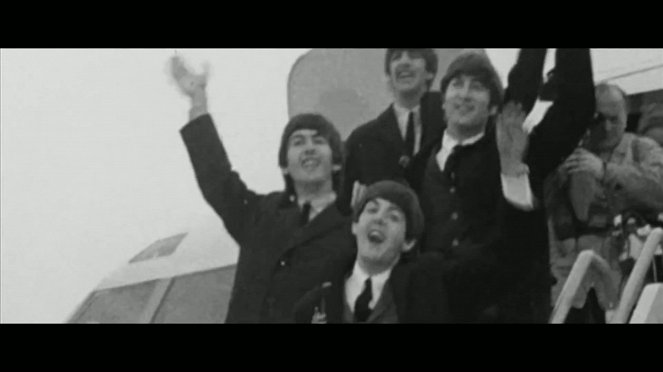Réalisation:
Ron HowardScénario:
Mark MonroeActeurs·trices:
The Beatles (i.a.), Paul McCartney, Ringo Starr, John Lennon (i.a.), George Harrison (i.a.), George Martin (i.a.), Whoopi Goldberg, Elvis Costello (plus)Résumés(1)
Avec des images rares et exclusives, The Beatles : Eight Days A Week – The Touring Years retrace les premières années de la carrière des Beatles de 1962 à 1966, marquées par les tournées incessantes à travers le monde. Des centaines de dates, des milliers de fans, des heures de concerts ont permis aux Beatles d'entrer dans la légende, mais aussi d'apprendre à se connaître, à se chercher, à se renouveler et à écrire ensemble toujours plus de chansons mythiques. Du Cavern Club de Liverpool à leur dernier concert au Candlestick Park de San Francisco, découvrez les Beatles comme vous ne les avez jamais vus et jamais entendus, à travers des enregistrements live et archives inédites. (Pathé Live)
(plus)Critiques (2)
I divide my admiration for The Beatles into two stages: before and after “Revolver”. I always condescendingly ignored the first stage, I took it as a time of catchy songs like the carefree "she loves you, yeeee, yeeee, yeeee... ", which I would listen to on the radio but never go back. But starting with “Revolver”, when the Beatles were almost determined to quit touring (which they literally called "the circus that has nothing to do with music"), because they couldn't hear their own words in the roar of the 60,000-strong crowds, let alone the instruments, I consider this phase of their career to be the best and most progressive rock music has ever produced. The Beatles soaked up musical influences like a sponge, starting with basic rock 'n' roll (especially in the beginning), through symphonic music to Indian elements with sitar sounds. They were the first to bring the sound of guitar distortion to the music world, so some of their songs are considered the first hard rock songs ever. On the aforementioned “Revolver”, they brought a bold fusion with Indian music in the song “Tomorrow Never Knows” with a drum rhythm never heard before in rock music. Then their musical genius, when they quit touring for good and devoted themselves purely to studio work, was like a treadmill. It's no wonder that the albums “Sgt. Pepper's Lonely Hearts Club Band”, “Abbey Road” and especially my most beloved “The White Album” (the elements, genres and bold musical experiments this two-album set contains is something incredible) are all in the top twenty best rock albums of all time in regular music critics' polls. “Sgt. Pepper's Lonely Hearts Club Band”, for example, is a triumph of music production (George Martin was a genius!), with all its sound gimmicks, tapes played backwards, loops, use of symphonic music, etc. etc. Howard's film doesn't deal with this creative phase, it only presents them before the breakthrough “Revolver”, showing that the worldwide Beatlesmania in the first half of the 60s was something unprecedented, which no other musical band has ever managed to repeat. As one famous music journalist said, The Beatles rid us of boredom forever. They were something completely new. Until then, only individual singers like Elvis Presley and Sinatra accompanied by an anonymous orchestra ruled, but the cheeky lads from Liverpool came along and demolished all the established pop culture orders to the ground. They were also fed by the times – the beginning of social changes in the 60s, the baby boom, when teenagers looked for someone they could identify with (who else but boys with rebel hairstyles, right), and in this enormous social brew (the end of the 50s innocence and naivety) The Beatles were one of the most prominent flag bearers. You can love Floyd, Led Zeppelin, Black Sabbath, Metallica and others, but no one can deny that these four guys from Liverpool are the biggest influence on modern rock.
()
When something even remotely hints at The Beatles, I'm extremely curious about it. And that's why I had to watch the movie The Beatles: Eight Days a Week - The Touring Years, which is a brief diary of their tours. Ron Howard doesn't bring anything new, but simply seeing those familiar faces, my beloved band, is a great experience. So yes, I'm subjective, but only because I adore them.
()

